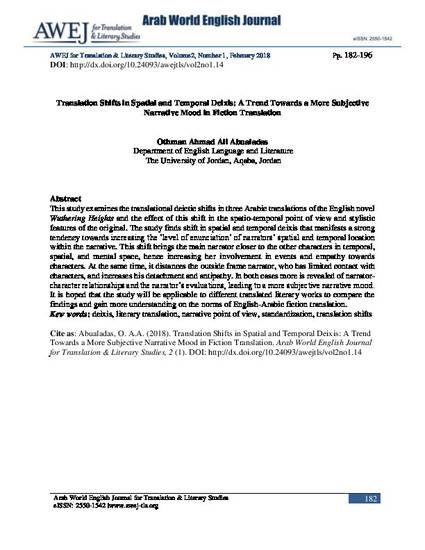
Article
Translation Shifts in Spatial and Temporal Deixis: A Trend Towards a More Subjective Narrative Mood in Fiction Translation
AWEJ for Translation & Literary Studies
(2018)
Abstract
This study examines the translational deictic shifts in three Arabic translations of the English novel Wuthering Heights and the effect of this shift in the spatio-temporal point of view and stylistic features of the original. The study finds shift in spatial and temporal deixis that manifests a strong tendency towardsincreasing the ‘level of enunciation’ of narrators’ spatial and temporal location within the narrative. This shift brings the main narrator closer to the other characters in temporal, spatial, and mental space, hence increasing her involvement in events and empathy towards characters. At the same time, it distances the outside frame narrator, who has limited contact with characters, and increases his detachment and antipathy. In both cases more is revealed of narrator-character relationships and the narrator’s evaluations, leading to a more subjective narrative mood. It is hoped that the study will be applicable to different translated literary works to compare the findings and gain more understanding on the norms of English-Arabic fiction translation.
Keywords
- deixis,
- literary translation,
- narrative point of view,
- standardization,
- translation shifts
Disciplines
Publication Date
Winter February 15, 2018
DOI
http://dx.doi.org/10.24093/awejtls/vol2no1.14
Citation Information
Othman Ahmad Ali Abualadas. "Translation Shifts in Spatial and Temporal Deixis: A Trend Towards a More Subjective Narrative Mood in Fiction Translation" AWEJ for Translation & Literary Studies Vol. 2 Iss. 1 (2018) p. 182 - 196 ISSN: 2550-1542 Available at: http://works.bepress.com/awejfortranslation-literarystudies/64/